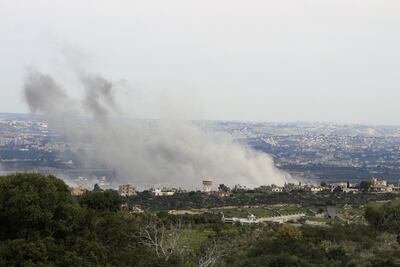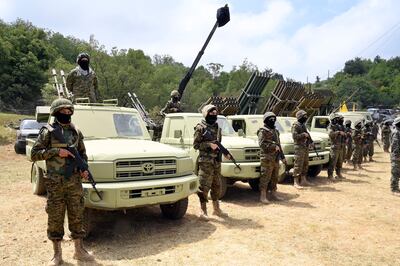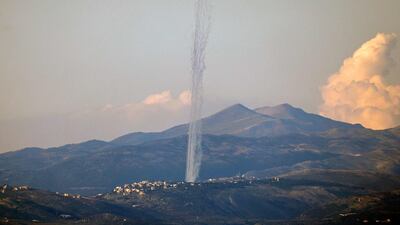Live updates: Follow the latest news on Israel-Gaza
Israel has planned for a war in south Lebanon to remove Hezbollah from the border and the militant group is preparing to face "all scenarios", including a ground invasion, military and security sources in both countries told The National.
Signs that a ceasefire might be imminent in Gaza have raised fears that Israel will turn its attention to south Lebanon where it has been engaged in cross-border fire with the powerful and heavily armed Iran-backed group since October 8.
The clashes have forced tens of thousands of residents from both sides of the border to leave their homes and seek safety elsewhere.
“Most of the Israelis who left their homes in the north aren’t willing to go back unless the threat of Hezbollah is removed. This is a source of big pressure on the Israeli military and government,” a security official said.

“It could mean another big war,” the official added.
According to military sources, Israel has “contemplated and planned” for a potential war in south Lebanon to remove Hezbollah from the border.
The war in Gaza is perceived as an existential war by Israel, with the well-trained and equipped Hezbollah forces seen as a significant part of that. If Israeli forces do not go into Lebanon soon, they would have to in the “long run”, the sources said.
The key objective would be to push Hezbollah between 10 and 15km from the border to put its anti-tank guided missiles and much of its rocket arsenal, which consists of unguided Katyusha-style rockets, out of range of the 60,000 Israeli residents who have fled the north. Many of Hezbollah's rockets have a range of 10-40km.
Indications are that if Hezbollah withdrew north of the Litani river, then there would be no need for conflict, the sources said.
Increasing pressure
On Monday, Israel stuck a site near the north-eastern Lebanese city of Baalbek, showing its willingness to engage in brinkmanship to achieve its goal of pushing Hezbollah away from the border in the absence of a diplomatic solution.
The strike close to the city, which is a tourist destination famous for its ancient ruins, was the deepest Israeli attack on Lebanon since the 2006 Israel-Hezbollah war.
The Israeli army said the strike was in response to Hezbollah's downing of a Hermes 450 drone over southern Lebanon. This was the second time the group has announced shooting down a drone since the start of the current cross-border clashes.
Experts say that the intensity of strikes, which have ventured deeper and deeper into Lebanese territory in recent weeks and culminated in the strike on Baalbek, is also an attempt by Israel to increase pressure on Hezbollah – goading them to react in such a way that could be used as a pretext by Israel to launch a full war on Lebanon.
On Sunday, Israeli Defence Minister Yoav Gallant indicated that Israel planned to increase attacks on Hezbollah in the event of a ceasefire in Gaza. But in facing Hezbollah, Israel would be fighting a far more potent threat than that in the Palestinian enclave, where nearly 30,000 Palestinians have been killed in the military onslaught.
Before this war in Gaza, armed groups in the enclave were thought to possess about 30,000 rockets, most of them unguided. Hezbollah, by contrast, is thought to possess anywhere between 100,000 and 150,000 rockets and guided missiles, some of them capable of accurately striking targets deep within Israel.

"Israeli threats to prepare military plans to attack Lebanon are not new ... and there are thousands of proven Israeli violations of Lebanon’s borders, waters and skies," a source close to Hezbollah said.
"The Islamic resistance in Lebanon will act, as it did in the past, according to the principle of defending Lebanon and working to liberate its occupied territories," the source added.
Cross-border violence has killed 276 people on the Lebanese side, most of them Hezbollah fighters, but also 44 civilians, according to an AFP tally. On the Israeli side, 10 soldiers and six civilians have been killed, according to the Israeli army.
In the 2006 war, approximately 1,200 Lebanese people died and 4,400 were wounded, mostly civilians. Israel, meanwhile, reported 158 deaths, most of them soldiers.
'All scenarios'
Towards the end of that conflict, Israeli forces identified an extensive network of underground tunnels and bunkers in border areas in south Lebanon, some just metres from the Israeli frontier, such as tunnels in the Labbnoune area near Naqoura.
They reportedly included firing positions, operations centres, connecting tunnels, medical facilities, weapon and ammunition stockpiles, ventilation and air conditioning, bathrooms with hot and cold running water, and dormitories, all with a roof built of slabs of reinforced concrete almost a metre thick.
For those living under the threat of Hezbollah rocket fire in northern Israel the only enduring solution is to put “boots on the ground” in southern Lebanon, Retd Brig Gen Ilan Lavi told The National on a recent trip to border towns.
In 1982, Israel invaded Lebanon under the pretence of stopping Palestinian raids across its border. Three years later, Israel withdrew to the Litani river and created what it called a security zone there. The Israeli occupation of the southern region continued until 2000.
The fear of infiltration by the Lebanese militant group's Radwan Force commandos has grown significantly since the Hamas-led October 7 attack, with Israeli villages preparing their own militias in defence.
Meanwhile, on the Lebanese side, Hezbollah, which has repeatedly said that it is not afraid of a large-scale war, has been preparing “for all scenarios”, including a ground invasion by the Israeli army, according to Lebanese security officials.
“Everything is being prepared in the south for war. Arms, defences, houses, food storage,” one of the security officials told The National.

